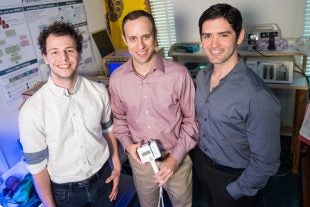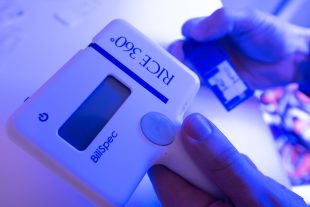
Clinical study validates effectiveness of device invented by Rice U. students
The first clinical study of a low-cost, hand-held jaundice detector invented by Rice University students couldn’t have come at a better time for NEST360°, an international team of scientists, doctors and global health experts preparing for a Dec. 11 competition for $100 million from the MacArthur Foundation. The money would allow the team to carry out its visionary plan to halve the number of newborn deaths in African hospitals within 10 years.
Photo: Rice University students (from left) Mathieu Simeral, Pelham Keahey (Applied Physics) and Kristofer Schroder helped complete the first clinical study of BiliSpec, a low-cost, battery-powered reader designed to diagnose jaundice by immediately quantifying serum bilirubin levels from a small drop of whole blood. (Photo by Jeff Fitlow/Rice University)

